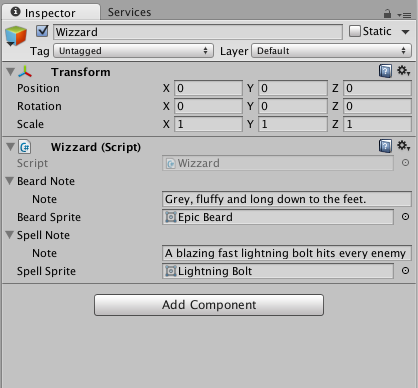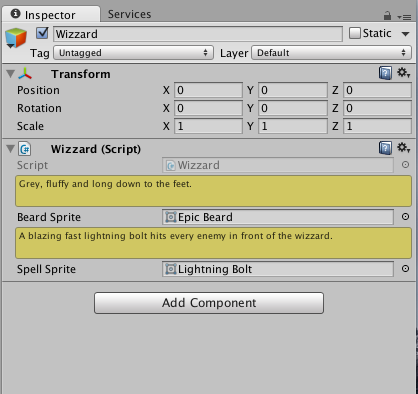Property Drawer
Instead of creating a custom editor for a MonoBehavior or a ScriptableObject that replace the default UI completely, you can create a custom editor for a specific type and only fields of that type will use your custom UI, the remaining inspector will still be the default one.


Lets say we have a custom type that replresents a description for an item
[System.Serializable]
public class Note
{
[SerializeField] private string note;
}
We would use such a type like so
public class Wizzard: MonoBehaviour
{
[SerializeField] private Note beardNote;
[SerializeField] private Sprite beardSprite;
[SerializeField] private Note spellNote;
[SerializeField] private Sprite spellSprite;
}
public class Gunslinger: MonoBehaviour
{
[SerializeField] private Note hatNote;
[SerializeField] private Sprite hatSprite;
[SerializeField] private Note revolverNote;
[SerializeField] private Sprite revolverSprite;
}
If we want to let the the Note stand out a bit every time it is seen in the inspector without creating custom editors for each an every MonoBehaviour or ScriptableObject that uses it, we can use PropertyDrawers.
using UnityEngine;
using UnityEditor;
[CustomPropertyDrawer(typeof(Note))]
public class NotePropertyDrawer: PropertyDrawer
{
public override float GetPropertyHeight(SerializedProperty property,
GUIContent label)
{
return EditorGUIUtility.singleLineHeight * 2f;
}
public override void OnGUI(Rect position,
SerializedProperty property,
GUIContent label)
{
EditorGUI.BeginChangeCheck();
var originalColor = GUI.color;
GUI.color = Color.yellow;
var noteProperty = property.FindPropertyRelative("note");
var helpBoxStyle = new GUIStyle(EditorStyles.helpBox);
var newNoteText = EditorGUI.TextField(position,
noteProperty.stringValue,
style: helpBoxStyle);
GUI.color = originalColor;
if (EditorGUI.EndChangeCheck())
{
noteProperty.stringValue = newNoteText;
}
}
}
Custom property drawers should be placed inside an Editor folder.